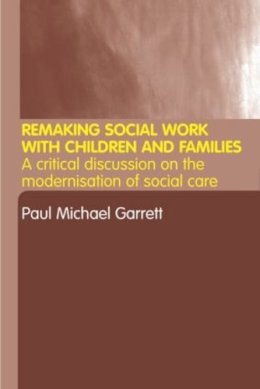‘A book for those who want to understand the immediate past, in the hope that it might enlighten the future for children’ - Chris Hanvey, UK Director of Operations, Barnardos in Community Care magazine ‘This is an excellent text for opening discourse between academics and researchers on data-gathering methods, which will truly assist social workers in their day-to-day work with clients, while simultaneously providing accountability. The text also facilitates teaching critical thinking to students’ - The British Journal of Social Work ‘The account is a passionate and thorough one…this makes a real contribution to critical writing on statutory social work in the UK, or more specifically, on social work with children and families in England and Wales. Garrett builds his analysis from the basis of current social work methods and, and in doing so, opens a window on the discourses which underpin social work practice today’ - European Journal of Social Work ‘[A] book for those who want to understand the immediate past, in the hope that it might enlighten the future for children’ - Chris Hanvey, UK Director of Operations, BarnardosCommunity Care (2003) 27 November ‘This is an excellent text for opening discourse between academics and researchers on data-gathering methods, which will truly assist social workers in their day-to-day work with clients, while simultaneously providing accountability. The text also facilitates teaching critical thinking to students' - Diane Jacobs, Tulane University, New Orleans The British Journal of Social Work (2004) vol. 34 (4) ‘[The] account is a passionate and thorough one…[T]his makes a real contribution to critical writing on statutory social work in the UK, or more specifically, on social work with children and families in England and Wales. Garrett builds his analysis from the basis of current social work methods and, and in doing so, opens a window on the discourses which underpin social work practice today’ - Viviene E. Cree, University of Edinburgh European Journal of Social Work (2004) vol. 7(1) ‘It provides a sound historical account of significant developments in children’s social work in England and Wales during the 1990s and in the early years of this century, including sections on looked after children, joint working in child protection, adoption and issues of race and ethnicity. It concludes with a valuable evaluation of the "emergent new professionals" and in particular a critical review of the Connexions Service. In the concluding chapter it anticipates some of the themes of the Green Paper such as Children’s Trusts and the Identification, Referral and Tracking system…The book could provide a useful overview of recent policy and practice developments for student social workers and could usefully stimulate class discussions in each of the areas it addresses’. - Chris Mills, NCPCC Social Work Education (2004) vol. 23 (3) ‘Many will find a resonance in his reminder to professionals that it can be their duty to dissent from the currently dominant political view. It is useful to have a senior academic in the field articulate the need for such autonomy and detachment’ - Julie Miller, Consultant Paediatrician, St James’ Hospital, Leeds Child Abuse Review (2004) vol. 13 (3) ‘Overall, this is a well-written, accessible and thought provoking book, which deserves a wide audience. It would be of interest to social work students, social care professionals, policy makers and academics’ - Pamela Attree, Institute of Health Research, Lancaster University Sociological Research Online (2004) 9/2 http://www.socresonline.org.uk/9/2/garrett.html ‘Paul Michael Garrett has been a consistent – and consistently stimulating – critic of the modernisation agenda in social work with children and families for several years now. [He] is widely read, and it shows. He brings a wide range of theoretical and factual sources to bear on his argument. His approach is intended to be critical but constructive, not simply debunking. It is also engaged from the beginning with the ethical purpose of social work with children and families’ - Nigel Thomas, University of Wales Children & Society (2005) Vol. 19 'This book makes a real contribution to critical writing on statutory social work in the UK, or more specifically, on social work with children and families in England and Wales. Garrett builds his analysis from the basis of current social work methods and tools, and in doing so, opens a window on the discourses which underpin social work practice today.' - European Journal of Social Work

